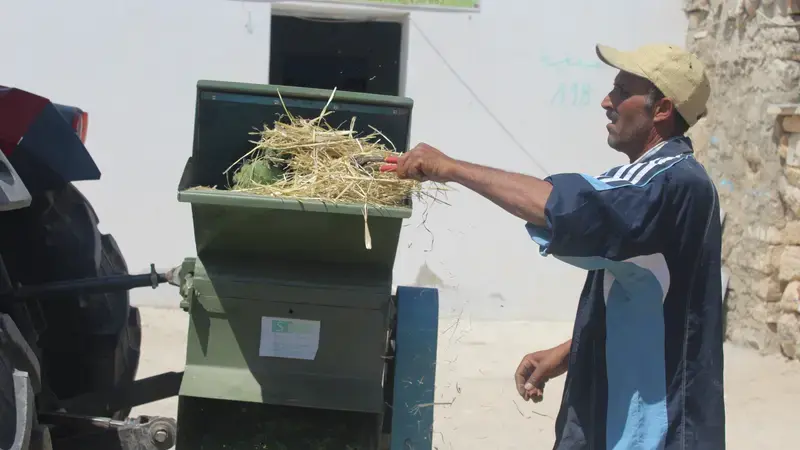Improving the integration of crop-livestock systems and conservation agriculture

1st to 4th July 2019. Tunisia. A recent travelling workshop, targeting participants in Algeria, Tunisia, and Morocco, explored best practices, frameworks and tools related to crop–livestock system under conservation agriculture (CLCA), a practice with significant potential in the dry areas. The workshop was part of an initiative funded by the International Fund for Agricultural Development (IFAD) and implemented by ICARDA and the International Maize and Wheat Improvement Center (CIMMYT), entitled ‘Use of conservation agriculture in crop-livestock systems in the drylands for enhanced water use efficiency, soil fertility and productivity in NEN and LAC countries.’
A key challenge holding back the wider adoption of conservation agriculture (CA) in the sheep-cereal production belt of North Africa, which the initiative targets, is the trade-off between leaving crop reside in fields and using the crop residue as animal feed, particularly in the summer months.
In response, ICARDA and its national partners are working together to fine tune economically- and environmentally-viable improved technologies to better integrate crop-livestock systems with CA and widen the adoption of CLCA.
Given the lack of rotation alternatives and biomass resources for animal feed, particularly during the summer months, the workshop assessed the effectiveness and potential of rational summer grazing, residual stubble mulch, and feedlot systems.
Additional objectives of the workshop aimed:
- to develop quick and reliable field tools to estimate stubble biomass, biomass intake, residual biomass, grazing intensity and to harmonize the methods between teams in target North African countries,
- to select the most suitable and flexible practices of forage integration in livestock feeding calendars, which can also fit with CA pillars and contribute to enhanced crop rotation
- to approach the livestock feeding systems from the on-farm and landscape point of views,
- to monitor feedlot systems for better efficiency, and
- to oversee flock and health management aspects that may hinder overall flock performance.
Through presentations, field days, focus groups with farmers, group exercises and discussions, the 23 participants - technical advisors, coordinators and collaborators who were associated directly with this initiative and other IFAD funded Projects —— were trained to identify the best CLCA practices. The traveling workshop also enhanced synergies between IFAD-funded projects in the area, to support exchange on thematic areas and to identify best practices and knowledge products that can be disseminated at scale for better crop-livestock integration.
The traveling workshop was divided into three main parts.
- The first part focused on basic concepts through keynote presentations and debates.
- The second consisted of three days of field study trips to different sites in semi-arid areas of Tunisia. During these visits, participants were able to discover and learn about various best practices for integrating crop-livestock systems under CA. These practices were already adopted by lead farmers (both large and small farmers communities) who also participated in the training, providing the rationale and the evidence of their production methods under CA.
- The last part of the training focused on the validation of unified tools for the sustainable use of stubble consistent with CA package, the finalization of a field intervention approach to support the implementation of the scaling road maps of best CLCA packages for the North African countries, and the identification of an extension approach and knowledge management tools for the packages under consideration.
Background:
The project is now in its second phase (13 April 2018 - 30 June 2022), and is designed to combine an adaptive research program, including integrated capacity development, with the active development of a delivery mechanism for CLCA systems to serve as impact accelerators in both targeted regions. The adaptive research component includes a subcomponent, which involves extensive socioeconomic and market data collection to be used for optimizing adapted packages for different agro-ecologies and socio-economic contexts.
Zied Idoudi (consultant in CLCA Phase 2 project) drafted this blog. For more information, please contact Dr. Mourad Rekik, ICARDA livestock scientist and the project coordinator, [email protected] or Dr. Aymen Frija, ICARDA agricultural economist , [email protected]





